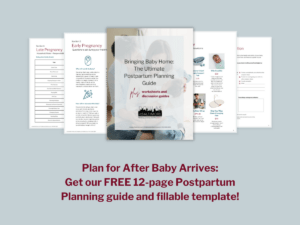You are going to have a baby, and then you are going to have to heal from having a baby. The massive unknown in that equation is all the experiences you will smooch together in your brain and label it: My Birth Story. Your postpartum recovery is a unique and important part of that story.
The birth story of your child starts when every you want it to start, and it ends when you say it ends. Most stories include the moments you thought you were labor, and have a tiny baby being held – by someone – at the end.
But regardless of the events, feelings, and choices of your birth, you will need to recover.
In our experience, the postpartum body and mind are neglected and underserved in the US. There are exceptions, and we have hopes of change. But most families are responsible for making arrangements for their mental and physical needs, all the while also learning and caring for a new person whom they just met.
The following professionals are presented for consideration with full knowledge that seeing all of these professionals may in itself become a difficult task, and therefore may also be a type of harm. So please, know that we know taking it a day at a time is a perfectly reasonable approach to your new life with your new baby. Let this short list be available to you, if and when you are at a place where you are seeking options for extended care outside of the walls of your home.
Who to include in your postpartum recovery
1. Chiropractor, at a family-friendly office
You can start chiropractic care during pregnancy for aches and pains, and even for help if your baby is presenting breach (or head up). But chiropractic care after delivery may be viewed as a luxury. The baby is born – why keep going?
Once you spend hours and hours, sitting, swaying, rocking, feeding, and not sleeping, your body – while recovering internally from birth – is being used in many ways that are out of the ordinary. Having the care of a chiropractor can help ease your body back into the world where you aren’t carrying a small life inside you, but instead, have a car seat draped over your elbow.
And why a family-friendly office? Because you may have your child with you. And knowing you have the time to be tended to, without needing to worry if anyone has eyes on your babe can mean the world of difference. Ask them if they are prepared to help new moms make their appointments. We’ve seen strollers get pushed back and forth, pacifiers get placed back in a mouth that has just learned to pop it out, and quite a few chins dabbed when a bit of spit up slips out. Ask.
2. Massage Therapist
Your body holds onto events long after they have happened. Are your shoulders tense right now from work, or that conversation yesterday, or because you are thinking about all the things you said you would do?
Now imagine how it will remember the task of moving a child into the world? Your body will be tender, and once you feel comfortable laying on your belly, having care from a professional who can help your body to release the tension it holds will be a world of difference for your mind, as well as your muscles.
You may get weepy on the massage table and not know why. You may miss your baby while in your appointment, and both love it and hate it. Being worked on by your therapist, you might realize, will be the first time in weeks where you are being touched with restorative energy, instead of having to be the one giving stimulation, food, or peace. Massages are not just for birthdays and anniversaries. Your body deserves to have attention be paid to it after doing the critical work of birth.
3. House Cleaner
This last one might be a stretch for you, but we want you to think about hiring a cleaning service to help in your first weeks home with your baby. Your attention will be divided between learning about your new child, grieving the loss of your old life, and being wrecked with an onslaught of hormones and sleep deprivation.
A professional cleaner is not someone you will need to worry yourself over. She or he can reduce your stress if you are frustrated with keeping up with old and new responsibilities, help prevent your space from becoming an isolated cave, and offer peace of mind that you and your baby are not having your immune systems overwhelmed by housework.
If there is a time to invest in supporting your entire family, taking the cleaning stress off of everyone’s plate is a caring way to start your first weeks as new parents.
As always Doulas of Baltimore is honored so many families are choosing our in-home postpartum team to come and help in the postpartum period. If you would like to talk with us about care options for support inside your home day or night, we want to hear from you. And if you need referrals to some of our favorite local professionals, just let us know!



